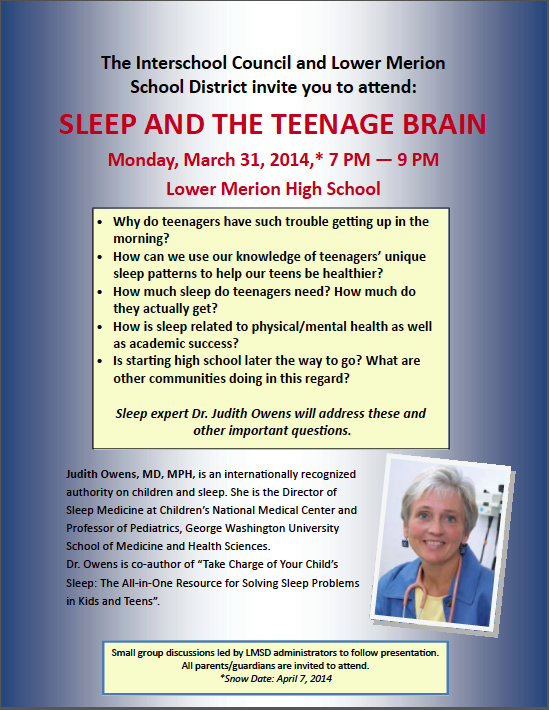“Sleep and the Teenage Brain” Event a Huge Success
Harriton students were recently told about the “Sleep and the Teenage Brain” presentation being presented at Lower Merion High School. The announcement included questions that caused almost all high school students to wonder; Why are we always so tired? Why do we have to get up so early? Last Monday, March 31, 2014 at 7pm, Dr. Judith Owens was invited and spoke about these poignant questions.
The Interschool Council (a parent leadership group within the Lower Merion School District) and Lower Merion School district’s Superintendent Dr. Christopher McGinley and Amy Norr (a proud parent of students who went or are going through the Lower Merion public education system) hosted Dr. Judith Owens. They began the presentation with a quick introduction, listing all of Dr. Owens impressive credentials. Owens is an internationally recognized authority on children and sleep. She is the co-author of the book “Take Charge of Your Child’s Sleep: All-in-One Resource for Solving Sleep Problems in Kids and Teens”. She is also the Director of Sleep Medicine at Children’s National Medical Center and Professor of Pediatrics at George Washington University School of Medicine and Health Sciences. These are just a few of the things mentioned in Dr. Owens’ resume.
Even before the presentation it was clear that the event was very well organized. All attending were given notecards and pencils to write down questions for the Q&A portion of the evening. They also created a plan of action if the event ran late, pushing the break out small group discussions to the following week. This was crucial because the presentation and Q&A portion did run longer than expected.
During Owen’s presentation, she quickly laid out objectives for the evening. She wanted to cover what happens to sleep during adolescence, the consequences of insufficient sleep and the evidence for delaying school start times.
In concern to what occurs during sleep in adolescence, it is important to look at the biology. Dr. Owens explained how the circadian rhythm, our biological body clock, changes with the onset of puberty. There is a shift to fall asleep later and wake up later. She even said “on a practical level, this means that it is almost impossible for the average adolescent to fall asleep much before 11pm on a regular basis”. Students’ sleep time may be further hindered because of environmental factors, which are competing priorities for sleep, such as homework and after-school activities. Dr. Owens explains how all of this is in contrast to the earlier school start times in middle and high school. Our bodies are not biologically programmed to wake up before 8am, leading us to try and compensate through irregular and unhealthy sleep patterns. The bottom line is that 80% of adolescents get less than the 9 and 9 ¼ hours of sleep a night recommended.
Why should we be worried about this? Well, Owens explains that sleep restriction has selective effects on our prefrontal cortex and, therefore, our executive functions such as judgment and motivation. She discussed an NSF poll in 2006 that showed that students getting less sleep are more likely to report feeling unhappy, sad or depressed, hopeless about the future, worried or negative about life. Owens also described other negative side effects such as health dangers and drowsy driving.
All of this culminated into the final part of the presentation, the discussion of later start times. Would later start times just cause students to go to bed later? No, apparently a study was done involving students in grades 6-12 in a school district who delayed their start times by one hour, students were found to go to bed at the same time. Would our academic performance improve? They would, in Kentucky, when school start times were shifted from 7:30 to 8:40 standardized test scores went up. Dr. Owens even discussed other alternatives to a late opening. She talked about emphasizing sleep as a health priority, helping students better manage their time and decreasing nightly homework hours. After, Dr. Owens summed up her presentation with a few clear slides entitled ‘Lessons Learned’. These slides talked about the repercussions of starting school later through a realistic lens.
After Dr. Owens’ presentation, there was a portion of time set out for questions and answers. Those who had thought of questions throughout the presentation now had an opportunity to voice their opinions. Some questions included; How does exercise after school affect a student’s sleep? And Have American high school start times always been this early? The following week, group discussions were set up so that people of the community could voice their opinion. This was open to all students, parents and community members. They were able to take the knowledge they had learned in Dr. Owens’ presentation and use it to voice their opinion.
Overall, as we force ourselves to get out of bed each morning, this is a problem that faces the entire Harriton and Lower Merion School district community. One parent who was present during Dr. Owens presentation said “Dr. Owens’ compelling presentation brought my attention to the real need for later school start times for high school students”. When asked, Senior Emilie Zeiss said “I feel like never get enough sleep and it hurts my school work”. If you want to see the presentation in full, please go to Ricky Report’s Youtube channel for the full presentation, courtesy of Ricky Sayer. In addition, if you want to make your opinion known, feel free to comment below or reach out to the administration of the Lower Merion School district.

Alana Koenig has been involved in newspaper for the past few years and is very excited to serve as a News Editor for the banner. Writing is only one of...


